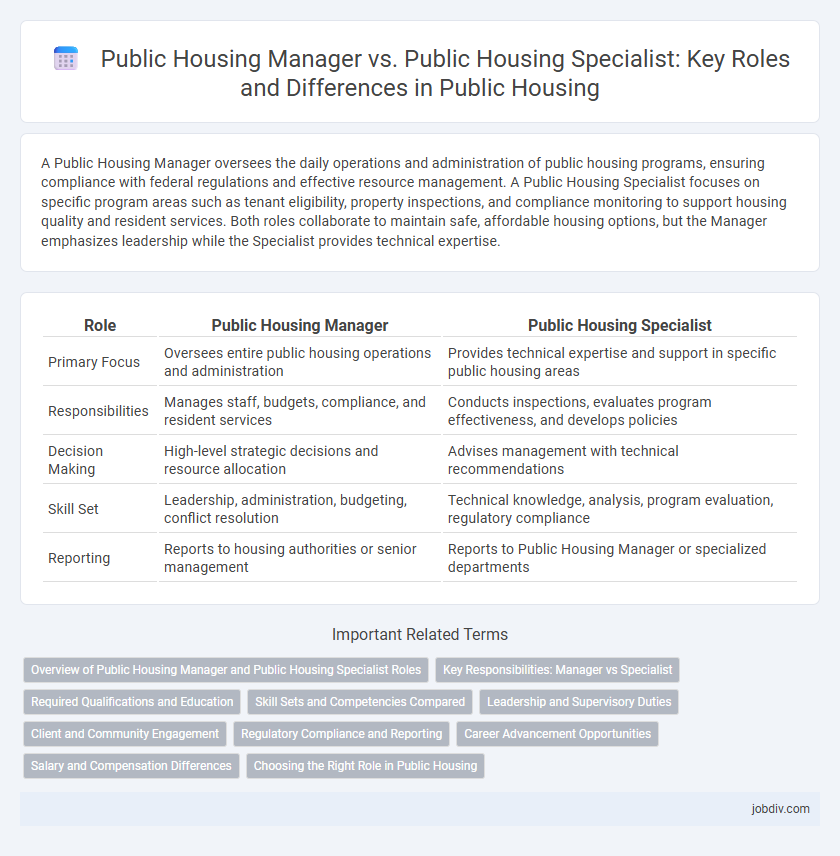A Public Housing Manager oversees the daily operations and administration of public housing programs, ensuring compliance with federal regulations and effective resource management. A Public Housing Specialist focuses on specific program areas such as tenant eligibility, property inspections, and compliance monitoring to support housing quality and resident services. Both roles collaborate to maintain safe, affordable housing options, but the Manager emphasizes leadership while the Specialist provides technical expertise.
Table of Comparison
| Role | Public Housing Manager | Public Housing Specialist |
|---|---|---|
| Primary Focus | Oversees entire public housing operations and administration | Provides technical expertise and support in specific public housing areas |
| Responsibilities | Manages staff, budgets, compliance, and resident services | Conducts inspections, evaluates program effectiveness, and develops policies |
| Decision Making | High-level strategic decisions and resource allocation | Advises management with technical recommendations |
| Skill Set | Leadership, administration, budgeting, conflict resolution | Technical knowledge, analysis, program evaluation, regulatory compliance |
| Reporting | Reports to housing authorities or senior management | Reports to Public Housing Manager or specialized departments |
Overview of Public Housing Manager and Public Housing Specialist Roles
Public Housing Managers oversee the daily operations and administration of public housing programs, ensuring compliance with federal regulations and coordinating maintenance, tenant relations, and budget management. Public Housing Specialists focus on policy implementation, program evaluation, and providing technical guidance to improve housing services and support community development. Both roles require expertise in housing laws, strong communication skills, and a commitment to affordable housing administration.
Key Responsibilities: Manager vs Specialist
Public Housing Managers oversee the daily operations, staff supervision, and enforcement of housing policies to ensure compliance with federal regulations and efficient management of public housing programs. Public Housing Specialists focus on evaluating tenant eligibility, managing lease agreements, and assisting residents with housing-related concerns while ensuring adherence to housing quality standards. Managers prioritize strategic planning and resource allocation, whereas Specialists concentrate on direct tenant services and program implementation.
Required Qualifications and Education
Public Housing Managers typically require a bachelor's degree in public administration, urban planning, or a related field, coupled with several years of experience in housing program management or community development. Public Housing Specialists often need a minimum of a high school diploma or equivalent, with preference given to candidates holding an associate or bachelor's degree in housing management, social work, or public policy, alongside specialized training or certifications in housing regulations. Both roles demand knowledge of federal housing laws, compliance standards, and strong organizational skills to effectively administer public housing programs.
Skill Sets and Competencies Compared
Public Housing Managers excel in leadership, project management, and budget oversight, ensuring compliance with federal housing regulations. Public Housing Specialists demonstrate expertise in tenant relations, eligibility determination, and program coordination, focusing on direct client service and policy implementation. Both roles require strong knowledge of housing laws and excellent communication skills, but Managers emphasize strategic planning while Specialists prioritize operational execution.
Leadership and Supervisory Duties
Public Housing Managers oversee multiple housing programs, ensuring compliance with federal and local regulations while leading teams to meet community housing goals. Public Housing Specialists focus on specialized tasks such as policy implementation and resident services, providing expert guidance without direct supervisory responsibilities. Leadership roles in management demand strategic decision-making and staff supervision, whereas specialists contribute through technical expertise and program support.
Client and Community Engagement
Public Housing Managers oversee the administration of housing programs, ensuring compliance and managing resources to support community housing needs. Public Housing Specialists focus on direct client interactions, assessing eligibility and facilitating access to housing services for vulnerable populations. Both roles prioritize client and community engagement, with Managers emphasizing strategic program oversight and Specialists delivering frontline support to enhance resident well-being.
Regulatory Compliance and Reporting
Public Housing Managers oversee regulatory compliance by ensuring adherence to federal, state, and local housing laws while managing operational policies. Public Housing Specialists focus on detailed regulatory reporting, conducting inspections, and analyzing compliance data to support continuous improvement. Both roles collaborate to maintain transparency and accountability within public housing programs.
Career Advancement Opportunities
Public Housing Managers oversee day-to-day operations and staff supervision, providing a clear pathway to senior management roles within housing authorities and government agencies. Public Housing Specialists focus on policy implementation, compliance, and tenant services, which can lead to specialized expert positions or policy advisory roles at the state and federal levels. Career advancement for Managers often involves broader administrative responsibilities, while Specialists gain advancement through increasing expertise in regulations and program development.
Salary and Compensation Differences
Public Housing Managers typically earn higher salaries than Public Housing Specialists due to their broader responsibilities in overseeing multiple housing projects and managing staff. The average annual salary for a Public Housing Manager ranges from $70,000 to $90,000, while Public Housing Specialists usually earn between $50,000 and $65,000. Compensation packages for managers often include performance bonuses and enhanced benefits reflecting their leadership roles in public housing administration.
Choosing the Right Role in Public Housing
Public Housing Managers oversee the daily operations and maintenance of public housing properties, ensuring compliance with federal housing regulations and managing staff and budgets. Public Housing Specialists focus on policy implementation, tenant relations, and providing technical assistance to improve housing programs. Choosing the right role depends on whether you prefer hands-on property management and leadership or specialized roles in policy and tenant services within the public housing sector.
Public Housing Manager vs Public Housing Specialist Infographic

 jobdiv.com
jobdiv.com